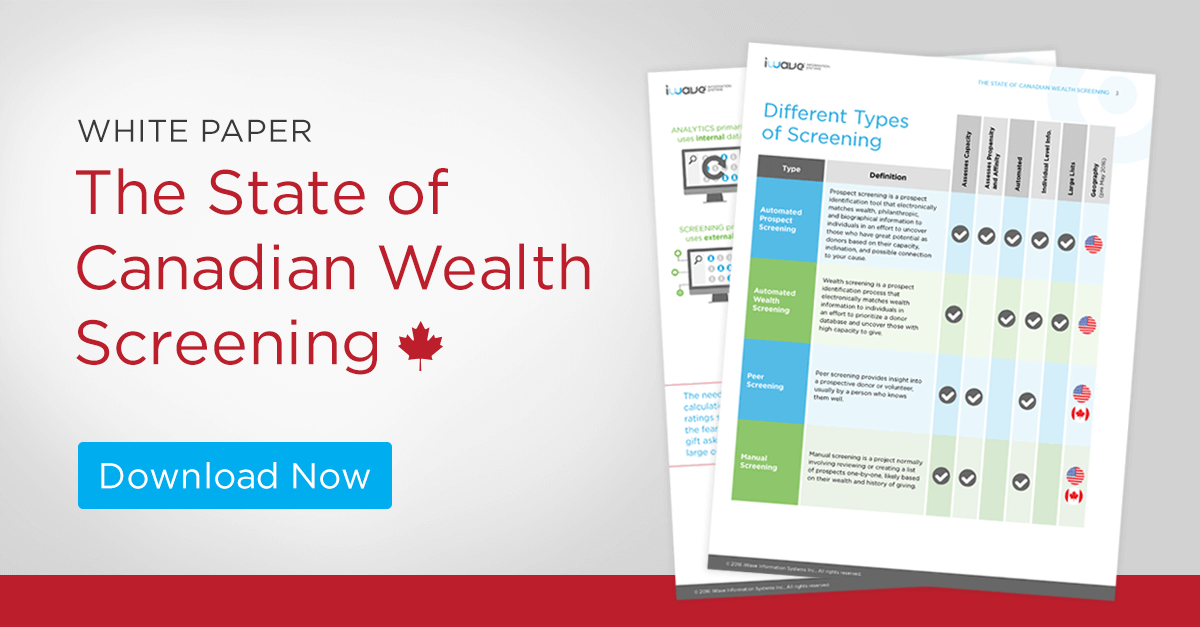The Case For Canadian Real Estate Research
 In a previous post, we explored just how important real estate data can be in your prospect research. But what about those pesky Canadians and their strict privacy laws? How are you going to learn more about prospects north of the border or, if you’re a Canadian nonprofit, in your very own community?
In a previous post, we explored just how important real estate data can be in your prospect research. But what about those pesky Canadians and their strict privacy laws? How are you going to learn more about prospects north of the border or, if you’re a Canadian nonprofit, in your very own community?
Canadian real estate presents an excellent challenge that can open doors to even more major gifts. Bad news first: because of the Canadian legal system, you may never know the exact value of your prospect’s home. More on that later.
Now for some good news: good Canadian real estate information is out there, and you can use it to build a stronger prospect profile. In order to do that, we need to adjust our research strategy just a little.
If you follow the iWave blog or industry thought leaders like Helen Brown or Jen Filla, you know that real estate holdings can be an excellent indicator of wealth. This is true in both the United States and Canada. To understand the opportunity of Canadian real estate, one only needs to look around at the beautiful homes in upscale neighbourhoods in Vancouver and Calgary or look to older cities like Toronto and Montreal.
Of course, there is more to our house hunting than just admiring great properties. We are looking for evidence of baseline capacity. And you don’t need to hit the road, either. You can find lots of Canadian real estate information online, both in free and subscription resources.
On average, an individual’s real estate holdings represent 20% to 25% of an individual’s net worth, whereas annual income tends to represent around 10% of net worth. Even if you only focus on your prospect’s annual income and stock holdings (estimated 30% of net worth), you are leaving a large stone unturned.
There are many resources and workarounds to help you calculate an effective estimate of your prospect’s real estate holdings. This helps inform your overall baseline capacity approximation.
Ever heard of the free real estate search site MLS.com? You may have noticed that Canada is not an option on this site. To search in Canada, you can visit REALTOR.ca, a sister site of MLS, to view listings in your prospect’s neighbourhood. Other databases exist that have more information, but be careful – some of those databases strictly prohibit using their real estate information for solicitation purposes.
There are also companies like Environics and Manifold Data Systems that provide accurate real estate estimates based on 6-digit Canadian postal codes. There are 782,000 postal codes across Canada and each code represents about 15 homes. Manifold collects and analyzes data from Statistics Canada, a government agency that produces census and key statistics data focusing on Canadians. Manifold lets you see the average property value, annual household income, and household donations for each postal code across the country. All this information is open and available for your research and fundraising purposes.
Researching Canadian prospects has its challenges, but there are ways to find valuable information about potential donors. If your fundraising team is going to make the right ask, you cannot discount real estate in your prospect research. Your house hunting could lead to your organization’s next major gift.

[divider type=”e.g. 1, 2″ width=”e.g. small, medium, wide”][/divider]
 About the author: Ryan McCarvill is iWave’s Content Manager. He joined the iWave team in 2016. Ryan enjoys meeting and learning from nonprofit professionals, researching trends in the nonprofit community, and offering strategies for development teams to use iWave’s solutions to meet and exceed their fundraising goals.
About the author: Ryan McCarvill is iWave’s Content Manager. He joined the iWave team in 2016. Ryan enjoys meeting and learning from nonprofit professionals, researching trends in the nonprofit community, and offering strategies for development teams to use iWave’s solutions to meet and exceed their fundraising goals.
Stay Up-to-date on Fundraising News and Resources